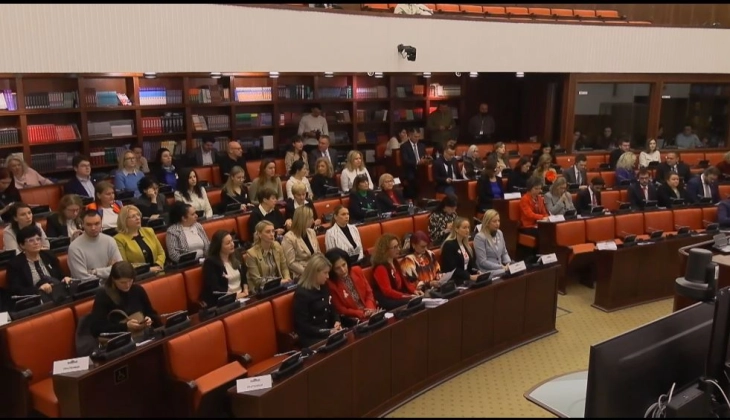Public debate on preventing and combating violence against women
- The country has a good legal regulation for preventing and protecting victims of violence, but lacks implementation, highlighted Monday's public debate entitled "Preventing and Combating Violence and Domestic Violence Against Women" as part of the Parliament's Committee on Equal Opportunities among Women and Men.

Skopje, 25 November 2024 (MIA) - The country has a good legal regulation for preventing and protecting victims of violence, but lacks implementation, highlighted Monday's public debate entitled "Preventing and Combating Violence and Domestic Violence Against Women" as part of the Parliament's Committee on Equal Opportunities among Women and Men.
Head of the OSCE Mission to Skopje, Ambassador Kilian Wahl, said that although North Macedonia's legal framework is solid, these laws must be fully implemented to ensure rapid response and great protection for victims.
"Laws against violence are only as effective as their enforcement, and that requires resources, trainings, coordinated approach from all stakeholders, police, judiciary, healthcare providers, and social services; including full implementation of the reforms stemming from the Istanbul Convention. North Macedonia has made international commitments to prevent and combat violence against women. However, OSCE findings on the well-being and security of women shows that half of women in Macedonia have experienced some form of violence in their lives. One in three women in North Macedonia have been sexually assaulted, fourteen percent have experienced physical or sexual violence, and one in ten experienced stalking. Oftentimes psychological violence is perpetrated by partners, with 44 percent of women suffering from this type of violence," Wahl said.

Elena Dimushevska, executive director of the National network to end violence against women and domestic violence, stressed that the situation in the country regarding this issue is different than 15 years ago, legislation has improved, but one large challenge persists- implementation.
"Every law requires funding. What was not anticipated when the Law on Prevention and Protection from Violence against Women was passed was how much money it would cost us as a state. More than three years after adopting the law we are nowhere close to meeting the minimum standards for specialized services, providing affordable and accessible special services to the women and children who survived violence. As civil organizations we were also worried by the news that the Ministry of Social Policy, Demography and Youth would cut funding for social services by almost 50 percent. We must ensure funds in the national budget, for ministries, and municipalities because without funds all legal changes we make will be absolutely unnecessary because they cannot be implemented,” Dimushevska explained.

Deputy Minister for Social Policy, Demography and Youth Gjoko Velkovski stated that the country has a network of social services, specifically, 30 centers for social work covering the entire territory.
"Our country ratified the Istanbul Convention, unfortunately, we are far from meeting its standards. Specialized serviced for women victims of violence have so far been established in 8 planning regions, but don't correspond to victims’ needs. In accordance to the Government's work program, in the coming period, we will establish 10 new specialized services for women victims of violence and domestic violence. We will also focus on drafting an eight-year national strategy for combating and protecting violence and domestic violence against women, and Action Plan for the implementation of the envisaged measures and activities," Velkovski said.

Parliament's Deputy General Secretary Boban Stojanoski pointed out the importance of implementing and improving laws, and that institutions must show zero tolerance towards violence, adding that - Parliament remains committed to working on improving equality between women and men, encouraging and supporting all activities on this path.
Justice Ministry representative Nikola Prokopenko announced amendments to the Law on criminal proceedings, which is currently being translated and will be submitted to the European Commission by year's end or at the start of next year.

UNDP's Kristina Plecic said that while there are ongoing discussions how to improve the system for protecting victims of physical violence, the number of technology-facilitated gender-based violence or digital violence continues to grow.
"This is going to become a real problem all the more because we are witnessing not only our lives, but especially the lives of young people, moving more and more into the virtual world. The country must be prepared in time to deal with this type of violence. UNDP’s analysis on the state of technology-facilitated gender-based violence showed that amendments are needed in a number of laws in order to address this type of violence, including Criminal Code amendments. We must work on the services. Not a single service in the country currently deals with this type of violence," stressed Plecic. ssh/ik/
Photo: Screenshot







